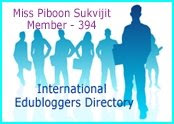“How Long Will It Take Me To Speak English Fluently?”
One of the questions that Thai learners, as well as other second language learners, always have in mind is “How long will it take me to speak English fluently?” This question is always in the back of the learners’ minds and never seems to disappear. After learning English or other second languages for awhile, the learners start to feel frustrated, disappointed, and become less motivated. As a result, the learners do not seem to gain language proficiency despite many years of learning it, especially in the speaking area because Thai and English are significantly different from each other. Therefore, this becomes one of the significant problems that hold back their potentials in learning English. However, instead of answering to the question, I’d rather restate it to “How will we speak English fluently?” Studying abroad? Paying a big ward of money to a language institute? Or Spending more time on reading something you like?
Certainly, my answer is reading. Generally speaking, it takes a long time, a lot of effort and endless practice in learning a new language such as English. Nevertheless, the learners can expedite the learning process by employing many different methods. One of them is reading. Reading is the key that helps second-language learners to develop their speaking skills. Most importantly, it is so cheap that sometimes it would not cost you a dime. By reading, the learners are able to expand their vocabulary and expressions used in every day conversation. Besides, they are vicariously and inevitably exposed to the new country and are able to understand its culture and people told in the story. Thus, this is another way to help the learners to be able to speak English correctly and fluently. Then, the new questions arise, “How can I start reading? And, what kind of book should I read?”
Based on a research, “reading is a habit which is developed at a very early age. If a child is in an environment where adults are always reading something, the child develops that habit. We need to have material that will entice the young to read more. It is from those romantic books that some of us have moved on to reading other things of importance.” This can be concluded that we should read at the early age. However, does it mean that it is too late for SPU students and other adult learners? No. Learning is never too late! The learners should start reading what they are most interested in. There are many numbers of books, magazines or articles for them to read. For beginners, they might want to read easy and short books, such as the penguin collection, that entice their interests. As soon as they gain enough vocabulary words, they might consider searching for more difficult books to read. If they like imagination, they might want to grab Harry Potter to read in their free time. Harry Potter consists of many episodes, and its next episode is coming out in a movie theatre next year. If they are interested in spiritual living and thoughts, they might want to find a book entitled Take Your Time by Eknath Eswaran. This book teaches them about how to live their lives to the fullest and how to put others’ first; it will certainly enlighten their restless minds! Last but not least, if they are in love, they might consider reading The Letter of Suzanne to Nicolas by James Patterson. This New York best-seller novel will surely bring them to tears, and you will understand the importance of love better.
Now that they know how imperative reading is and what books to read, they can get started on building the habit of reading and find a good book to read. However, they have to START NOW! NO PROCRASTINATING! Once their reading is sharpened, then their speaking will become superb and their writing will be remarkable. Although you should keep in mind that things do take time. If anyone has good books to share with me, please feel free to do so. By Ajarn Piboon Sukvijit
Saturday, November 15, 2008
“How Long Will It Take Me To Speak English Fluently?”
Thursday, November 13, 2008
Learning through extra curriculum--English for Business Negotiations
An English for Business Negotiation Project--A Hand-on experience on Negotiations
This activity was taken place in 2007 and was initiated in order to meet with the course objectives and provide the students an opportunity to gain more knowledge, practice, and performance by doing. I always attempt to see my students , especially forth year ones, brush up and employ their accumulated knowledge and skills to good use on their last year of the academic surrounding. Thus, this seminar was done by the students with the teacher providing the guidelines; it was also the integral part of the learning process, which is concentrated on learning by doing.
This course is designed to provide opportunities for forth-year students to improve both their negotiation and English language skills (especially speaking and writing). This is a ‘hands-on’ course where students will learn the basics of the negotiation process, including tactics and language required to conduct effective negotiations. Cross cultural awareness, including verbal and non-verbal languages, will be introduced to the students. Nevertheless, the focus will be on learning, practicing, and refining skills in using the English language in negotiations while reflecting upon performance so that the students can apply their skills to the ‘real world.’ The activities to be practiced will train the students to practice their speaking, listening, writing skills of English in correlation to negotiation process.

